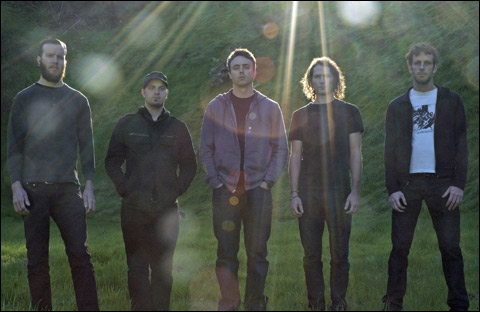
LOOMINGS: Isis were the poster children for a new, brainy form of slow-burning metal that made it cool for kids in black hoodies to listen to Mogwai. |
Wherever you put the needle down in Isis's heavy catalogue, you know what to expect — the sound of two decades of sludge metal and crystallized hardcore dissonance strapped onto a derelict oil tanker and pushed out to sea. Albums appear every few years like snapshots taken of what loomed off its monstrous hull. Whether in a blistering metallic track like 2000's "Celestial (The Tower)" or in the shimmering, shifting mode they had developed by 2009's "Ghost Key," the weapon of choice for the band who invented "post-metal" has always been momentum.
At least, it was until now. But this week, the ship will wash up back where it started, here in Boston. After 13 years, singer/guitarist Aaron Turner and the band (Jeff Caxide, Michael Gallagher, Aaron Harris, and Bryant Clifford Meyer — all New England kids except Ohio native Meyer) have announced that they're packing it in after this month's US tour. "We've said everything we want to say," they wrote in a press release, and you'd be remiss in trying to prove them wrong. They intend to wrap things up after a tour that'll include a New England homestand anchored by back-to-back nights at the Paradise this Sunday and Monday.
It's been seven years since Isis left Beantown (and their jobs at the Newbury Comics warehouse) for LA. At that point, their methodic style and association with Boston's blenderized late-'90s hardcore/metal scene (which took in the fresh-faced Converge, Cave In, and Piebald, all of whom released through Turner's Hydra Head label) were racking up buckets of cred. But they had only one full album release under their belt, 2000's Celestial (Escape Artist), and were just getting past their very convincing Neurosis impression. Something serious was under way, and yet the local shows they headlined sure weren't selling out.
Right before they left, though, they dropped Oceanic, their first album for Mike Patton's Ipecac Recordings. "That was a pivotal moment for us," says Turner, speaking over the phone from his home in the woods outside Seattle. "We'd shed a lot of our influences and found more of our own voice." The record made waves everywhere, from UK mag Terrorizer to the New York Times, and it bulldozed all kinds of boundaries. Within a year, the band were the poster children for a new, brainy form of slow-burning metal that made it cool for kids in black hoodies to listen to Mogwai. Outside of a small following of devotees, this is how a lot of Boston fans first started paying attention.
Turner saw that despite the cross-genre camaraderie of the band's younger days, some of the early crowds just weren't having it. "We didn't fit into any of the already established categories, so people didn't necessarily know how to perceive us. So I think it was good for us to be around bands who were adventurous, like Cave In [with whom Isis will reunite in Portland this Tuesday, June 22]. But as far as garnering a strong following, I don't think that happened until we moved away."